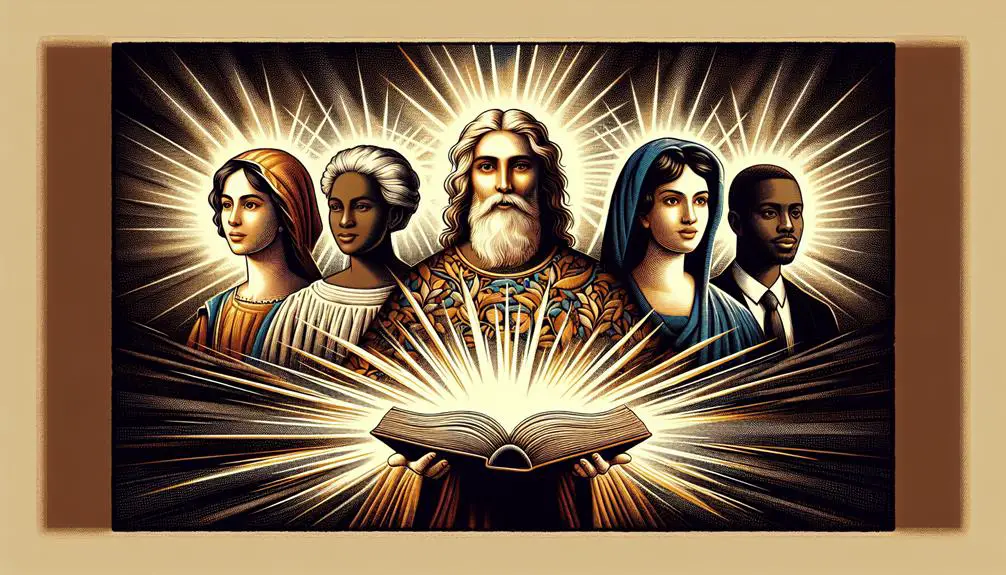Navigate the transformative power of repentance in the Bible, uncovering its pivotal role in redemption and why it's essential for spiritual growth…

Importance of Repentance in the Bible
When King David confessed his sin with Bathsheba, he set a profound example of repentance in the Bible.
As you explore this theme, you'll find that repentance isn't just about saying you're sorry; it's a crucial step toward receiving divine forgiveness and plays a pivotal role in salvation.
The Bible is filled with instances where repentance led to transformative change, not only in individuals but also in entire communities.
By examining these examples, you're poised to uncover the depth of its significance and how it can impact your understanding of faith and redemption.
Why is this concept so central to the biblical narrative? The answer might surprise you.
Key Takeaways
- Repentance is a transformative journey essential for spiritual renewal and divine forgiveness.
- It signifies a deep, internal change aligning one's life with God's expectations.
- Repentance is foundational for salvation, requiring sincere acknowledgment and amendment of sins.
- Through repentance, individuals experience personal growth and contribute to community cohesion and spiritual well-being.
The Biblical Foundation of Repentance

Understanding the biblical foundation of repentance requires delving into scripture, where it's portrayed as a transformative process essential for spiritual renewal and reconciliation with God. At its core, repentance involves a profound heart change, a shift from one way of being to another that aligns more closely with divine expectations. This isn't merely an external modification of behavior but a deep, internal transformation.
Central to this transformation is the metanoia concept, a term that encapsulates repentance in the New Testament. Metanoia signifies a change of mind, but it's far more than a simple shift in opinion or attitude. It's an overhaul of one's entire perspective, affecting how one perceives God, oneself, and the world. This concept underscores repentance as not just a singular act of contrition but a continual process of turning towards God and away from actions and attitudes that separate one from the divine presence.
This foundational understanding prompts you to reflect on the nature of repentance as an ongoing journey rather than a one-time event. It challenges you to consider how heart change, facilitated by the metanoia concept, is integral to genuine spiritual renewal.
Repentance and Divine Forgiveness

Central to the Christian journey, repentance paves the way for divine forgiveness, offering believers a path to restore their relationship with God. This restoration isn't just a theological concept but is deeply intertwined with psychological benefits and influenced by cultural perceptions. Through repentance, you experience a cleansing of guilt and a renewal of spirit, which underscores the psychological benefits of this spiritual practice. This sense of renewal is pivotal, as it aligns with the Christian belief that God's forgiveness is unconditional, provided one genuinely repents.
Cultural perceptions of repentance and divine forgiveness vary widely, yet they often emphasize the transformational aspect of repentance. In some cultures, repentance is seen as a duty, a necessary step towards rectification and divine pardon. In others, it's perceived as a deeply personal journey that strengthens one's faith and relationship with God. These perceptions shape the approach to and understanding of repentance, highlighting its importance across different Christian communities.
Reflecting on repentance and divine forgiveness reveals a multifaceted concept that's integral to the Christian faith. It's a process that not only promises divine forgiveness but also fosters personal growth, community cohesion, and a deeper understanding of God's grace.
The Role of Repentance in Salvation

Repentance serves as a crucial gateway to salvation, demanding a heartfelt acknowledgment of one's sins and a genuine commitment to amend one's ways in the light of divine expectations. Understanding its role within the broader context of salvation prerequisites is essential to grasp the eternal consequences tied to one's spiritual journey.
Consider the following imagery to encapsulate the essence of repentance in the quest for salvation:
- A shattered mirror, symbolizing the broken state of humanity due to sin, which only repentance can begin to mend.
- A narrow bridge over a vast chasm, representing the precarious path from sin to salvation that repentance offers.
- A locked door with a unique key, illustrating how repentance is the critical key to unlocking the door of salvation.
- A heavy chain broken link by link, each piece signifying a sin confessed and forsaken through repentance.
- A sunrise after a dark night, depicting the new beginnings and hope that repentance brings to a believer's life.
In essence, repentance isn't merely an optional component of faith; it's a fundamental prerequisite for salvation. It acknowledges one's sins and their eternal consequences, fostering a transformative process that aligns one's life with divine will and expectations.
Examples of Repentance in Scripture

ARTICLE TITLE: Repentance in the Bible
PREVIOUS SUBTOPIC: 'The Role of Repentance in Salvation'
CURRENT SUBTOPIC: 'Examples of Repentance in Scripture'
Having established the vital role of repentance in the journey towards salvation, let's now examine specific instances within the Bible where figures exemplify this transformative process. The narratives of the Prophet Jonah and Zacchaeus' conversion stand out as profound illustrations of repentance, shedding light on its profound impact.
Biblical Figure |
Description of Repentance |
|---|---|
Prophet Jonah |
Initially fleeing from God's command, Jonah's eventual submission and repentance in the belly of a great fish highlight the depth of true repentance. |
Zacchaeus |
A wealthy tax collector, Zacchaeus' conversion is marked by his vow to give half of his possessions to the poor and repay those he cheated fourfold, demonstrating repentance through action. |
King David |
After his sin with Bathsheba, David's heartfelt confession and penance in Psalm 51 showcase the sincerity of repentance. |
Peter |
His bitter tears after denying Christ thrice signify a deep remorse and a turning back to God. |
The Prodigal Son |
His return home, admitting his wrongs to his father, symbolizes the essence of repentance and forgiveness. |
These examples not only illustrate the act of turning away from sin but also underscore the diverse ways repentance manifests in one's life.
Transformative Power of Repentance

Delving into the transformative power of repentance, it's crucial to recognize how this profound change not only alters one's path but also rebuilds relationships with the divine and the community. Repentance isn't merely an act of seeking forgiveness; it's a journey of personal growth that has far-reaching societal impacts. This transformation is deeply personal, yet its ripples can be felt across communities and generations.
Consider the imagery of repentance:
- A wilted flower regaining its vibrancy after being nurtured back to health, symbolizing rebirth and renewal.
- A fragmented mirror pieced together, reflecting a once broken but now whole and introspective self.
- A storm clearing, with sunlight piercing through the clouds, representing the clarity and peace that follows sincere repentance.
- A bridge being rebuilt over a chasm, illustrating the restoration of relationships that were once severed.
- An empty canvas gradually filled with vibrant colors, denoting the endless possibilities that follow a commitment to change.
Through repentance, you're not just altering your own course; you're influencing the fabric of society. Personal transformation leads to collective healing, demonstrating the profound interconnection between individual actions and societal well-being.
Frequently Asked Questions
How Do Different Christian Denominations Interpret the Concept of Repentance, and Are There Significant Variations?
You'll find that Christian denominations vary in their interpretation of repentance, with significant differences emerging. Some regard sacramental penance as essential, while others focus on personal repentance without formal rites.
Theological debates further complicate the picture, as interpretations of scripture and doctrine diverge. Reflecting on these variations, it's clear that understanding repentance isn't one-size-fits-all but a complex, deeply rooted aspect of Christian faith.
Can Repentance Play a Role in Improving Mental Health or Psychological Well-Being According to Christian Teachings?
In the tapestry of your life, weaving in repentance can fortify mental resilience and spark emotional healing. Analyzing Christian teachings, you'll discover repentance isn't merely about seeking forgiveness; it's a transformative process.
It encourages introspection, facilitating a deeper understanding of oneself and fostering a nurturing environment for psychological well-being. Reflectively, embracing repentance can act as a catalyst for profound personal growth and bolster your mental and emotional health.
In the Context of Interfaith Dialogues, How Is the Christian Understanding of Repentance Similar to or Different From Repentance in Other Major Religions?
You're exploring how the Christian concept of repentance compares with other major religions in interfaith dialogues. This comparison sheds light on shared values and distinct beliefs, offering a rich tapestry of interfaith perspectives.
It's fascinating to see how different faiths perceive repentance, whether it's a path to divine forgiveness, a process of personal transformation, or a combination of both. Understanding these nuances can deepen your appreciation of the diverse religious landscape.
How Have Historical Events or Cultural Shifts Influenced the Christian Church's Teachings on Repentance Over the Centuries?
You're diving into an ocean of change when exploring how historical events have reshaped the Christian church's stance on repentance.
From the rigorous Medieval penance practices to the seismic Reformation impacts, each era brought its own flavor to understanding repentance.
These shifts didn't just pop up overnight; they were deeply influenced by cultural tides and scholarly debates, painting a complex picture of evolving theological thought throughout centuries.
Are There Any Specific Practices or Rituals Associated With Repentance in Christianity, and How Do These Vary Among Different Cultures or Regions?
In Christianity, you'll find diverse practices linked to repentance, reflecting cultural nuances. These range from wearing specific repentance attire to engaging in personal accountability sessions.
Such rituals vary widely among cultures and regions, underlining the personal and communal aspects of repentance. It's fascinating how these practices not only embody a physical act of contrition but also foster a deeper, reflective process of personal and spiritual growth within diverse Christian communities.
Conclusion
In conclusion, repentance isn't merely an act; it's a transformative journey vital for spiritual renewal and salvation.
Consider the story of Jonah, who reluctantly embarked on a path of repentance, not only for himself but also leading an entire city towards redemption.
This narrative underscores repentance's power to mend the relationship between humanity and the Divine, emphasizing its pivotal role in achieving divine forgiveness and eternal salvation.
Through repentance, one experiences profound spiritual regeneration, illustrating its indispensable place within biblical teachings.



Sign up